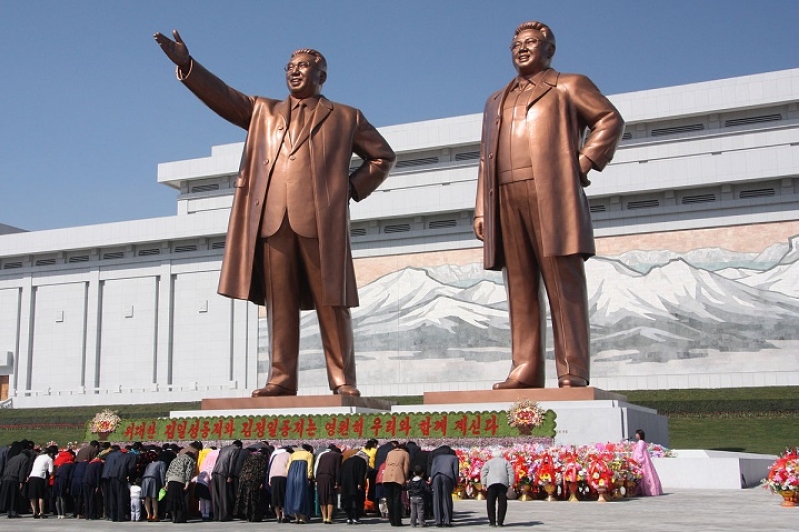
A Christian woman who fled North Korea has shared how, as a child, she was too scared to even touch a Bible - but revealed Christianity is growing in the country despite the government's brutal efforts to suppress it.
Growing up in the totalitarian communist state - where Christianity is a crime - Kim Sang-Hwa had no idea her parents were Christians.
"Like so many Christian families, our family was banished in the 1950s to a remote village," she told persecution watchdog Open Doors USA. "They continued to hide their faith from the outside world, but I remember waking up one night when I was six. Our house was very small, so we all slept in the same room. When I opened my eyes, I saw my father and mother under the blanket and I could hear the soft noise of the radio. Later I learned they were listening to a broadcast from a Christian radio station."
One day, she found a Bible hidden deep in a closet. Terrified, Kim considered turning her parents into the authorities; in the country, Christians are frequently sentenced to labor camps simply for owning a Bible.
"I was afraid to touch the Bible, but I couldn't just leave it there," she recounted. "I closed my eyes, picked up the book and put it back. I weighed my options. Should I tell my teacher? Should I visit the local security official? For fifteen days I couldn't think about anything else. I knew it was my duty to report this illegal book. But it was my family which was involved. And I also had all these questions: 'Who is this God? Or 'what'?'
Finally, she asked her father about the forbidden book.
"He was very surprised and sat next to me," she said. "He asked me: 'Do you see those old trees?' I nodded. 'Who made those?' I said I didn't know and he explained the story of creation to me, including how God had made Adam and Eve."
After that, Kim's mother began teaching her how to memorize Bible verses and the Apostle's Creed. Her father explained the full Gospel to her, and her grandfather taught her how to pray.
"It is just talking to God. Nothing more, nothing less," he'd tell her.
"To me all those stories and ideas were so interesting," she said. "I also read the Bible for myself. But I realized it was dangerous. My father always emphasized not to share anything with anyone else. Then he would start to pray in whispers, almost inaudible. 'Father, help the North Korean people to seek your Kingdom first'."
Sometimes, Kim's father would meet people in a secret location, where they would pray together and discuss the Bible.
"When one of those visitors was dying, my father went to see him on his deathbed," she recalled. "He confessed: "I know everything about you, your family and your faith. I was a spy and ordered to watch you."
"And?" my father asked.
"You are a good man. I never told anyone you were a Christian. Tell me how I can become a Christian too."
"In the final moments of his life, this man repented and entered the Kingdom of God. My father was able to lead him there," she said.
After Kim got married, she and her husband worked to care for the homeless in North Korea - but life became increasingly more difficult.
"Out of every three people, at least one of them was a spy," she said. "Because of our wealth-which was obtained through my father's profession and our relatives in China-we were labeled as 'followers of capitalism.' Afraid for our family's safety we left our 2-year-old son with my parents and fled the country."
Today, Kim lives in South Korea with her family - but she hopes to one day return to her home country and share the Gospel.
"I wish I could go back to North Korea and share the Gospel with the people there and have fellowship with the local believers," she said. "I love their faith. I'd be ready to die for the Gospel. I think that if I didn't have a family here in South Korea, I would have returned already and help the people in need."
Every day, Kim prays that one day, everyone in North Korea will seek first the Kingdom of God. Sometimes, she gets discouraged, she admitted.
"I feel the same as many believers around the world where it seems like nothing is changing in North Korea," she told Open Doors. When I pray, I often ask God: 'What's the point? Why do you want me to keep on praying for North Korea?' But then God reminds me: 'You know North Korea better than anyone else. You know the people and their suffering. If you won't pray, who will? Rely on Me. Believe in Me.'"
Open Doors has ranked North Korea as the most oppressive place in the world for Christians, #1 on the World Watch List. It's estimated that between 30,000 and 70,000 Christians are held in "kwanliso," or political labor camps.
"Christians are forced to hide their faith completely from government authorities, neighbors and often, even their own spouses and children," notes the outlet. "Due to ever-present surveillance, many pray with eyes open, and gathering for praise or fellowship is practically impossible. Worship of the ruling Kim family is mandated for all citizens, and those who don't comply (including Christians) are arrested, imprisoned, tortured or killed."
Kim Chung-seong, a defector from North Korea who spoke at the World Summit in Defense of Persecuted Christians in May, said the government fears the spread of the gospel.
"The one thing that the North Korean regime fears the most, and is afraid of, is the spreading of the Gospel," he said, according to the Catholic News Agency. "Because the Bible and the Gospel speaks the truth. Once the light shines in the dark room, there is light in the room."
"They [the government] will do anything to prevent the spread of the Gospel in North Korea," he said, adding that the government even set up a "façade" organization called the Korea Christian Association to lure the believers.
"But] as you can see, we cannot block the sunlight with our hand," he said.







